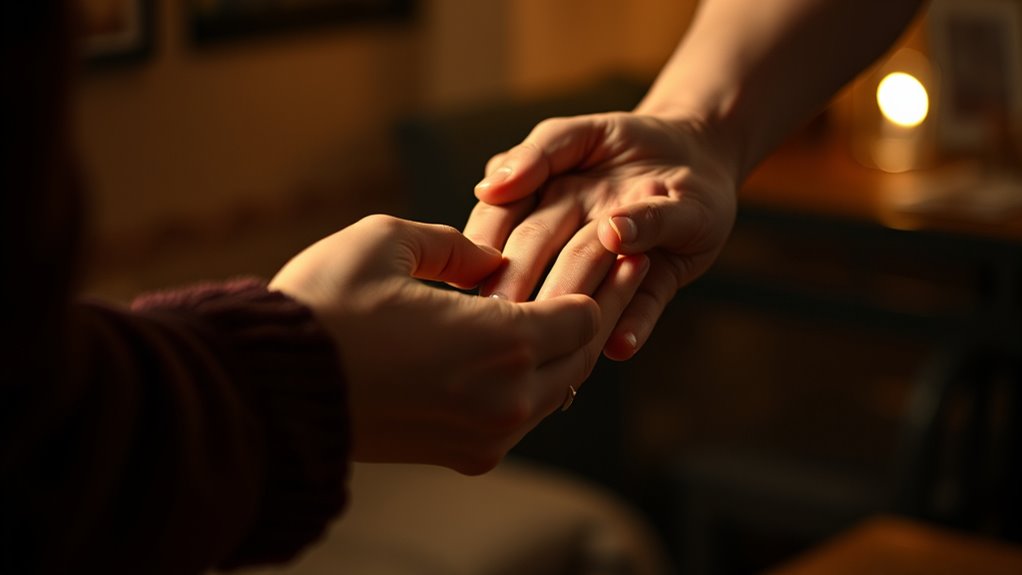Supporting a friend stuck in toxic relationships without judgment means listening empathetically and creating a safe space for them to share. Focus on understanding their feelings, gently helping them reflect on what they truly need, and encouraging self-esteem and healthy habits. Remember, change takes time, so be patient and consistent in your support. If you stay compassionate and attentive, you’ll discover more ways to guide them toward healthier choices.
Key Takeaways
- Practice active listening and create a safe space for your friend to share feelings without judgment.
- Ask gentle, reflective questions to help them explore their needs and boundaries at their own pace.
- Encourage activities that boost self-esteem and independence, reinforcing their worth outside toxic patterns.
- Show patience and consistent support, understanding that change is gradual and driven by their own realizations.
- Offer empathetic understanding, avoiding criticism, and remind them of their value and right to healthy love.

When you notice your friend repeatedly stays in toxic relationships despite knowing they’re harmful, it can feel frustrating and confusing. You might wonder why they keep returning to the same unhealthy patterns, especially when they seem aware of the damage. It’s important to remember that emotional attachment and familiarity often outweigh logic in these situations. Your friend’s choices aren’t always about weakness or stubbornness—they’re influenced by complex feelings, past experiences, and sometimes even a fear of being alone. They may also believe they can change their partner or that the relationship will improve someday, even if history suggests otherwise. It’s natural for emotional bonds to be difficult to break, particularly when combined with attachment styles that influence how they relate to others. Recognizing this helps you approach the situation with empathy rather than judgment.
Instead of pointing out how wrong or harmful their choices are, focus on listening and understanding. Let your friend talk openly about their feelings without interrupting or dismissing their perspective. Sometimes, just having someone who genuinely listens can help them process what they’re experiencing. Avoid criticizing or labeling their partner or relationship; that could make them defensive or less willing to open up. Remember, your goal isn’t to rescue them or fix everything overnight. Instead, you want to create a safe space where they feel supported and understood.
Listen without judgment to help your friend feel supported and understood.
Encourage your friend to reflect on what they truly want and need from a relationship. Ask gentle questions like, “What makes you happy in a relationship?” or “What are your boundaries?” These questions can help them gain clarity without feeling judged. It’s essential to acknowledge that change takes time, and they need to come to their own realizations at their own pace. Offering supportive communication and patience can help them feel less pressured. Offer gentle reminders that they deserve respect, kindness, and healthy love—things they might be missing in their current situation. But be cautious not to push too hard; pushing can backfire and make them retreat further into their cycle.
Support your friend in building their self-esteem outside of their relationships. Encourage activities that boost their confidence and remind them of their worth, whether that’s pursuing hobbies, spending time with other friends, or seeking professional help if they’re open to it. Sometimes, people cling to toxic relationships because they’re afraid of being alone or losing familiarity. Helping them see their value outside of the relationship can empower them to consider healthier choices. Recognizing and addressing emotional dependencies can be crucial in their healing process. Ultimately, your patience and compassion matter most. You can’t change their mind or their situation overnight, but your unwavering support might be the catalyst they need to start making different choices.
Frequently Asked Questions
How Can I Tell if My Friend Truly Needs Help or Is Just Hurting?
When you wonder if your friend needs help or is just hurting, pay attention to their behavior and feelings. Do they consistently stay in harmful relationships despite knowing they’re damaging? Are they withdrawing or showing signs of depression? If their pain affects their daily life or they seem trapped and unable to break free, it’s a good sign they need support. Offer a listening ear and gently encourage professional help if needed.
What Are Common Signs Someone Is in a Toxic Relationship?
Think of toxic relationships as the original “bad apple” in your social basket. You might notice signs like constant criticism, feeling drained after interactions, or feeling like you’re walking on eggshells. Your friend may isolate themselves, lose confidence, or make excuses for their partner’s behavior. If you see these signs, gently check in and offer support. Recognizing these cues helps you understand when someone’s stuck in a harmful cycle.
How Should I Approach My Friend Without Making Them Defensive?
You should approach your friend with empathy and a non-judgmental attitude. Start by expressing concern gently, using “I” statements like, “I’ve noticed you seem upset lately, and I care about you.” Listen actively without interrupting, showing you’re there for support. Avoid blaming or criticizing, and instead, ask open-ended questions to let them share. This way, you create a safe space, making them less defensive.
Can Toxic Relationship Patterns Be Changed or Only Avoided?
You might wonder if toxic relationship patterns can change or if you just need to avoid them. The truth is, patterns can be changed with awareness and effort, but it’s often challenging. You can help your friend by encouraging self-reflection and seeking healthier habits. While avoiding toxic patterns is easier initially, lasting change requires addressing underlying issues, so with support and time, transformation is possible.
When Should I Seek Professional Help for My Friend?
You should seek professional help for your friend when their toxic relationship patterns cause significant distress, affect their daily functioning, or if they’re unable to recognize or break free from these cycles on their own. If you notice signs of emotional or physical harm, persistent sadness, or withdrawal, encourage them to see a counselor or therapist. Your support can guide them toward necessary professional assistance, especially if they’re struggling to change on their own.
Conclusion
Remember, you’re not alone in wanting to help your friend break free. Over 60% of people in toxic relationships feel trapped but hesitate to leave, often due to emotional ties or fear. Your support and understanding can make a real difference. Be patient, listen without judgment, and encourage them to seek professional help if needed. Small steps can lead to big change—your kindness could be the catalyst they need to find healthier, happier relationships ahead.









